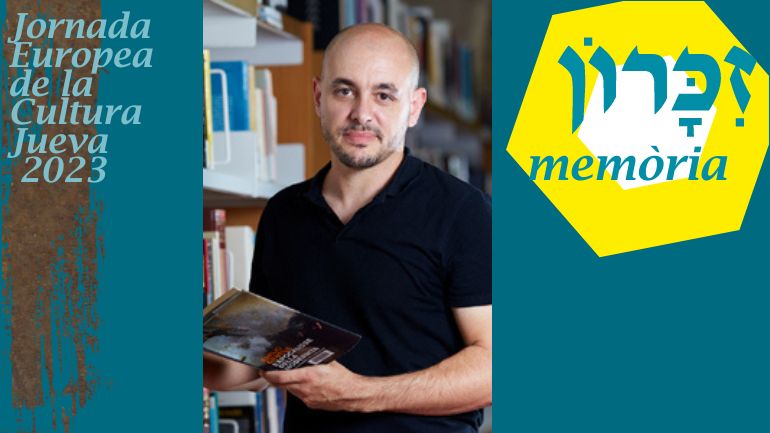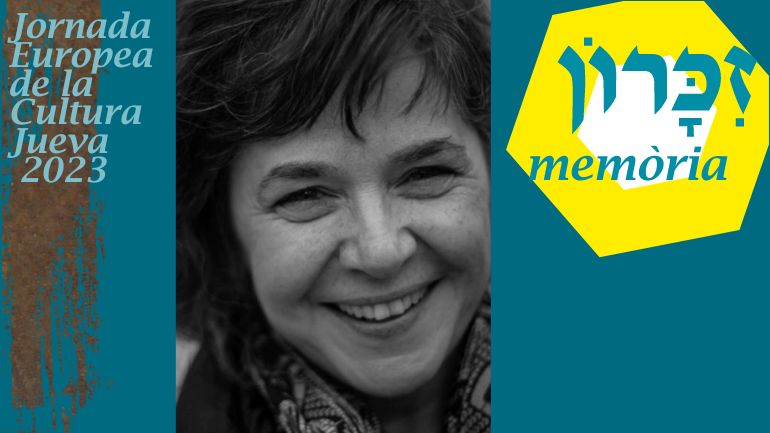The program Reflections around Walter Benjamin is a cycle of conferences to deepen the knowledge of the figure, life and thought of this German philosopher, as part of the temporary exhibition Walter Benjamin's Dreams. Watercolors by Gemma Romero Goday.
The program Reflections around Walter Benjamin is a cycle of conferences to deepen the knowledge of the figure, life and thought of this German philosopher, as part of the temporary exhibition Walter Benjamin's Dreams. Watercolors by Gemma Romero Goday.
Conference within the framework of the exhibition "Primo Levi Anthology". Artistic exhibition by Alexandra Genís.
Free access, prior registration is required.
Conference in Catalan.
CENTRUM BADAŃ KULTURY ŻYDOWSKIEJ przy WYDZIALE FILOLOGICZNYM UNIWERSYTETU ŁÓDZKIEGO oraz CENTRUM DIALOGU im. MARKA EDELMANA w ŁODZI zapraszają do udziału w Międzynarodowej Konferencji Naukowej CHAVA ROSENFARB I ŻYDOWSKIE PISARKI XX WIEKU
Stulecie urodzin pochodzącej z Łodzi, ale tworzącej po wojnie, głównie w Kanadzie, Chavy Rosenfarb (1923-2011), uważanej za najwybitniejszą współczesną pisarkę języka jidysz, to okazja, by poddać refleksji naukowej nie tylko powieści, wiersze i eseje jej autorstwa, ale także przyjrzeć się twórczości innych dwudziestowiecznych żydowskich pisarek, które artykułowały w podobny lub właśnie odmienny sposób swoje doświadczenie żydowskie, kobiece i genderowe. Pragniemy poszerzyć pole naszej uwagi, choć już same teksty Rosenfarb są bardzo interesującym materiałem do badań nad wątkami autobiograficznymi w literaturze, fikcjonalnymi reprezentacjami Zagłady, zapisami doświadczenia getta, próbami literackiego odtworzenia zaginionych światów sztetla i żydowskiej Łodzi czy nad znaczącymi te wszystkie światy „śladami płci”.
A Testimony of Survival: A Meeting with Bernard Offen, a Concentration Camp Survivor
A series of events*
European Days of Jewish Culture 2023**
Thursdays, September 28th, and October 12th at 6pm
We would like to invite you to unique meetings with Bernard Offen, a true hero and a Holocaust Survivor. The meetings will be a chance to get to know the life story of Mr. Offen, but also to understand the deep human strength and resilience in the most difficult circumstances.
During the meetings Mr. Bernard Offen will share his personal story from the times, when he was a little boy living in the district of Podgórze and the difficult time he had to survive during the Second World War. We will get to know his childhood memories, hear more about his parents, brothers, and friends, but also his painful experiences from the ghetto and concentration camps such as Plaszow, Auschwitz, and Birkenau.
1 października 2023 r., godz. 14.30
Wielka Synagoga w Tykocinie ul. Kozia 2, 16-080 Tykocin
W ramach Europejskich Dni Kultury Żydowskiej w Wielkiej Synagodze odbędzie się wykład dr Małgorzaty Frąckiewicz – wiceprezes Łomżyńskiego Towarzystwa Naukowego im. Wagów. Wzbogacona o prezentację multimedialną prelekcja, przybliży uczestnikom spotkania zwyczaje, tradycje i stosunki polsko –żydowskie regionu łomżyńskiego i Tykocina.
W łomżyńskim cyklu wydawniczym Łomżyńskiego Towarzystwa Naukowego im. Wagów: Pinkasy przedniemeńskie, czyli w księgach pamięci gmin żydowskich z regionu mazowiecko-podlaskiego swoistym centrum jawi się Tykocin przywoływany w rozmaitych kontekstach poznawczych. Wydaje się niekiedy, że wszystkie drogi prowadzą nie do Rzymu, a do Tykocina. To miejsce naznacza tradycja wspólnoty żydowskiej, jej dynamika gospodarcza, niezwykła mobilność i aktywność w regionie, co przekłada się na obecność Żydów tykocińskich w przestrzeni wspomnień, jakie ożywają w przetłumaczone na język polski księgach pamięci.
Wśród licznych jidyszowych dzienników wydawanych w międzywojennej Warszawie znalazł się również "Warszawer Kurjer", którego nagłówek głosił, iż jest gazetą dla wszystkich. Taki też jest nasz Warszawer – program dla wszystkich zainteresowanych żydowskimi dziejami naszego miasta.
Jesienną odsłonę cyklu Warszawer otworzy wykład Kamila Kijka „Warszawa vs. prowincja. W stronę ludowej historii polskich Żydów w XX wieku. Zapraszamy 28.09.2023 o 18:00 na Chmielną 9A!
Klika słów o prowadzącym:
Kamil Kijek – doktor, historyk i socjolog, adiunkt w Katedrze Judaistyki im. Tadeusza Taubego Uniwersytetu Wrocławskiego, zajmuje się historią Żydów w Europie Środkowo-Wschodniej w XX w. Do jego najważniejszych publikacji należą: Was It Possible to avoid ‘Hebrew Assimilation’? Hebraism, Polonization, and the Zionist “Tarbut” School System in the Last Decade of Interwar Poland („Jewish Social Studies” 2016, t.
A Testimony of Survival: A Meeting with Bernard Offen, a Concentration Camp Survivor
A series of events*
European Days of Jewish Culture 2023**
Thursdays, September 28th, and October 12th at 6pm
We would like to invite you to unique meetings with Bernard Offen, a true hero and a Holocaust Survivor. The meetings will be a chance to get to know the life story of Mr. Offen, but also to understand the deep human strength and resilience in the most difficult circumstances.
During the meetings Mr. Bernard Offen will share his personal story from the times, when he was a little boy living in the district of Podgórze and the difficult time he had to survive during the Second World War. We will get to know his childhood memories, hear more about his parents, brothers, and friends, but also his painful experiences from the ghetto and concentration camps such as Plaszow, Auschwitz, and Birkenau.
Alfabet hebrajski jest nieodłącznym elementem kultury żydowskiej i ma kluczowe znaczenie dla rozumienia i przekazywania wiary oraz tradycji. Ten wyjątkowy system pisma ma głębokie znaczenie nie tylko w sferze komunikacji pisemnej, ale również jako nośnik duchowej i kulturowej mądrości.
Podczas spotkania "Alfabet hebrajski: więcej niż litery – kultura i historia", przyjrzymy się nie tylko technicznej stronie alfabetu, ale także zrozumiemy, jak głęboko wpłynął on na kształtowanie tożsamości, wierzeń i wartości żydowskich na przestrzeni wieków.
Żeby uczestniczyć w spotkaniu nie trzeba wcześniej znać hebrajskiego. Wszystko będzie wytłumaczone podczas prezentacji.
Koszt: wydarzenie bezpłatne.
Zapisy: https://docs.google.com/forms/d/e/1FAIpQLSc490FDJSzs7MYnVoeIRRnC15ZgG4vvcp9dMMmynwiShQGaWw/viewform?fbclid=IwAR1UdMl60RLjk5qRvlN6PhU2Xo7alpXW3tMu–BS1NZ3oqWkI8HY4SRL38Y
Szczegóły: Wydarzenie odbędzie się 24.09.2023 o 17:00 na platformie Google Meets. Link do spotkania będzie przesłany drogą mailową do zapisanych uczestników (odnośnik do formularza w komentarzu). Spotkanie potrwa około 60 min.
In conjunction with the very successful temporary exhibition at the Irish Jewish Museum, “Estella Solomons and the Solomons Family”, Estella’s grandniece Susan Solomons will look at three of the six generations of the Solomons family in Dublin. Susan will discuss how her family impacted and were impacted by their environment of 19th, 20th and 21st century Dublin.
The focus of this talk will be on Rosa and Maurice’s communal leadership, Estella’s artistic talent and republican involvement, as well as Bethel and Michael’s role in promoting women’s health.









